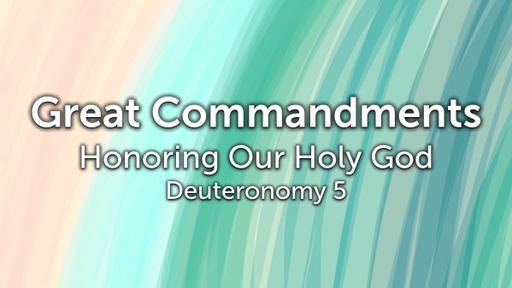Great Commandments

Great Commandments
43. What is the preface to the Ten Commandments?
The preface to the Ten Commandments is in these words, I am the Lord thy God, which have brought thee out of the land of Egypt, out of the house of bondage.
44. What doth the preface to the Ten Commandments teach us?
The preface to the Ten Commandments teacheth us that because God is the Lord, and our God, and redeemer, therefore we are bound to keep all His commandments.
2. Saying that the Lord is a jealous God makes a covenantal claim about God and expresses a positive word about the proper and inherent exclusiveness that belongs to the nature of the relationship between God and God’s people, or to the nature of covenant. As a covenantal claim, the jealousy of God has a double force: jealousy for Israel’s full and exclusive worship of the Lord (Exod. 20:5; Deut. 32:16, 21; Ps. 78:50) and jealousy or zeal for God’s powerful commitment to and love for his people, as one sees, for example, in such contexts as Isaiah 9:7; 26:11 (“Let them see thy zeal for thy people”); 37:31–32; 59:17 (where the armor of God is righteousness, salvation, vindication, and zeal or jealousy—all to do battle for justice). The jealousy of God, therefore, is that dimension within the divine encounter with the Lord’s people that brooks no other final loyalty and ensures no other recipient of such unbounding love and grace. It is God’s way of saying, I will have nothing less than your full devotion, and you will have nothing less than all my love. It is the kind of attribute that belongs to a marriage relationship, where there is a proper covenantal jealousy.
45. Which is the first commandment?
The first commandment is, Thou shalt have no other gods before me.
46. What is required in the first commandment?
The first commandment requireth us to know and acknowledge God to be the only true God, and our God, and to worship and glorify Him accordingly.
47. What is forbidden in the first commandment?
The first commandment forbiddeth the denying, or not worshipping and glorifying, the true God as God, and our God; and the giving of that worship and glory to any other, which is due to Him alone.
48. What are we specially taught by these words, before me, in the first commandment?
These words, before me, in the first commandment teach us that God, who seeth all things, taketh notice of, and is much displeased with, the sin of having any other God.
49. Which is the second commandment?
The second commandment is, Thou shalt not make unto thee any graven image, or any likeness of anything that is in heaven above, or that is in the earth beneath, or that is in the water under the earth; thou shalt not bow down thyself to them, nor serve them; for I the Lord thy God am a jealous God, visiting the iniquity of the fathers upon the children unto the third and fourth generation of them that hate me: and showing mercy unto thousands of them that love me, and keep my commandments.
50. What is required in the second commandment?
The second commandment requireth the receiving, observing, and keeping pure and entire, all such religious worship and ordinances as God hath appointed in His Word.
51. What is forbidden in the second commandment?
The second commandment forbiddeth the worshipping of God by images, or any other way not appointed in His Word.
52. What are the reasons annexed to the second commandment?
The reasons annexed to the second commandment are, God’s sovereignty over us, His propriety in us, and the zeal He hath to His own worship.
53. Which is the third commandment?
The third commandment is, Thou shalt not take the name of the Lord thy God in vain: for the Lord will not hold him guiltless that taketh his name in vain.
54. What is required in the third commandment?
The third commandment requireth the holy and reverent use of God’s names, titles, attributes, ordinances, word, and works.
55. What is forbidden in the third commandment?
The third commandment forbiddeth all profaning or abusing of anything whereby God maketh Himself known.
56. What is the reason annexed to the third commandment?
The reason annexed to the third commandment is that however the breakers of this commandment may escape punishment from men, yet the Lord our God will not suffer them to escape His righteous judgment.